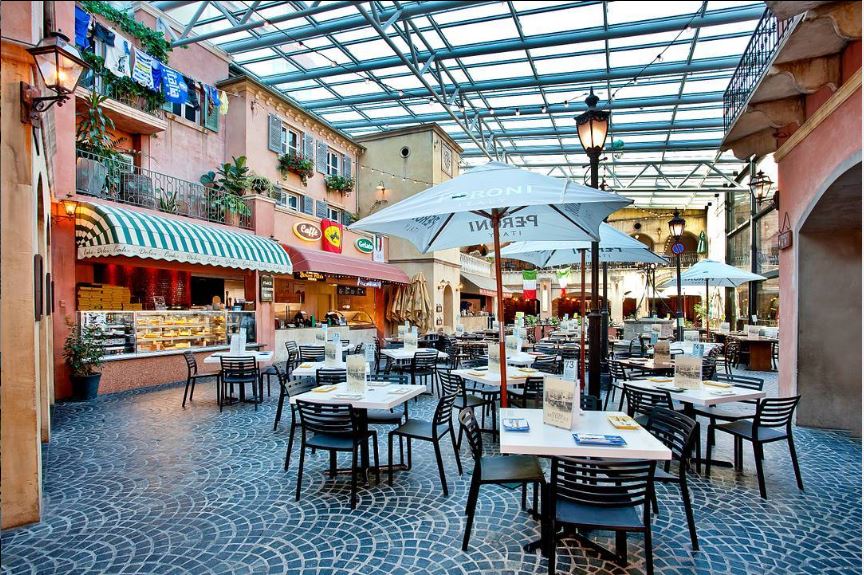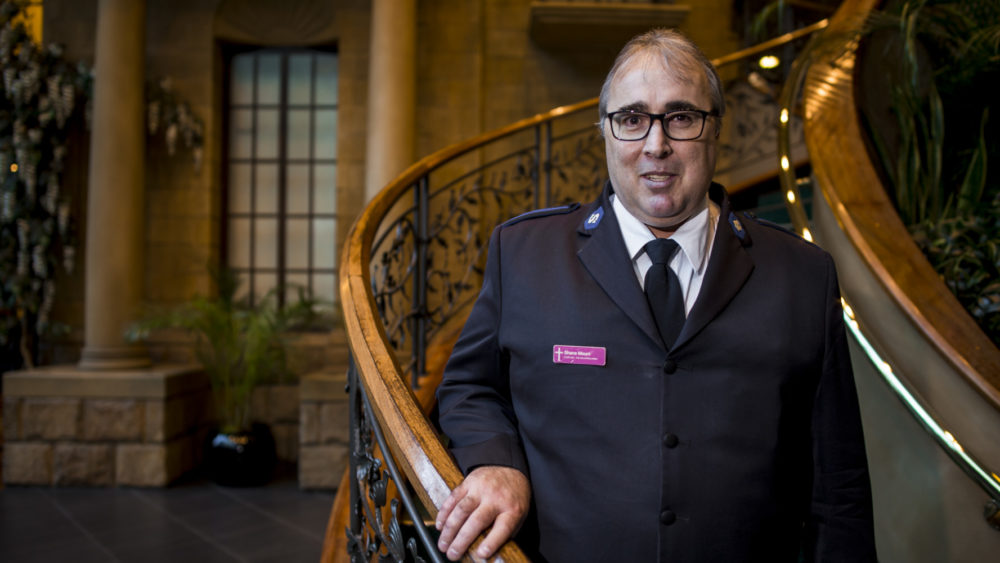In one day as the chaplain at Bankstown Sports Club, in Sydney’s south west, Shane Mount will walk between 10 and 15 kilometres, just around the club itself. When I speak to him early on a Tuesday morning, his schedule looks packed:
“I’ll meet up with the Legacy group, and then the darts and bingo group this morning as well. I’ll see about 400 people just in my first few hours today. But it’s always the ladies at bingo who I come across first. They’ll all get here hours before the bingo starts, just to chat and connect,” Shane says.
It’s in the Rainforest Lounge – a more typical club feature with a bar, lines of neat dining tables and a fake but lush rainforest canopy – where Shane meets a lot of people for the first time. They’ll often be sitting alone, and Shane takes the opportunity to say hello.
“There are a lot of people in the community, especially elderly people, who are socially isolated. They come to the club on their own, looking for connection. I see if there’s groups I can connect them with, people they can meet.”
Shane met one lady in the Rainforest Lounge who he was able to connect with a group of older women playing bingo. “She’s still in that group three years later. She’s made life-long friends.”
When ClubsNSW and the Salvation Army launched a club chaplain program at the end of 2013, it was criticised by some Christian leaders including anti-gambling advocate Tim Costello as being used as a club PR stunt. Costello accused the Salvation Army of helping clubs improve their image without having any real impact on problem gambling.
“I walk through the pokie machine area and the people know… there’s someone there if they need some help.” – Shane Mount, Bankstown Sports Club chaplain
Shane acknowledges that helping someone with a gambling addiction is tough.
“The person needs to recognise themselves that they have a problem before the journey of recovery can really begin,” he says.
But Shane believes his physical presence in the club and his daily tour around the pokie machines can offer a way out.
“I just build up relationships. I walk through the pokie machine area and the people know there’s someone there who they can visually see all the time, but also someone is there if they need some help. It’s pretty important. The change in their lives is amazing to see, when they finally do change. And that’s why I’m here. That’s why God put me in this place, to make an impact in someone’s life. And I do see it all the time.”
But four years into the job and as the first chaplain at Bankstown Sports Club, Shane says he believes his role is far greater than what even the club itself had originally envisioned. The President of the club called the program “a huge success” in a recent club annual report.
“Every week God just puts someone in front of me who he really wants to here from through my ears.”
“[Chaplains] can do so much more for people on the ground than what management of a club can do. I can visit a member who is sick, or take some food around when they need it. I can talk one on one about grief. All the things they might share with a bartender they can now share with me and I can offer some proper assistance, a genuine listening ear and can refer them on to services they might need.”

The ‘Piazza’, one of the many restaurant areas in Bankstown Sports Club.
Over 50,000 people visit Bankstown Sports Club every week, supported by over 650 staff. Shane says he feels a responsibility to connect with as many of those people as possible.
“Going home is the hardest. There’s always something else to do, someone else to talk to.”
Bankstown Sports Club is one of the largest clubs in NSW. It’s got an indoor Italian piazza, a railway-themed restaurant where you can dine in a fully decked-out (though stationary) steam train, a brewery, an adjoining hotel, a 10m high indoor children’s play centre and an indoor rock climbing centre.
“Some people see clubs as these big concrete things, but they can be the heart of communities. In Bankstown, the club really is at the centre of things. Everybody comes here to meet friends or make friends.
“This is where people are. They’re not coming to church.”
“This is where people are. They’re not coming to church. Our congregations aren’t getting bigger. They’re going to clubs and shopping centres to connect with people. I think it’s important to meet people where they are. Club chaplaincy is still new – there aren’t many of us in clubs yet – but I think we can help create those connections and start conversations.”
Shane cites 1 Peter 4:8-11 as his inspiration in his role as chaplain:
“Above all, love each other deeply, because love covers over a multitude of sins.9 Offer hospitality to one another without grumbling. Each of you should use whatever gift you have received to serve others, as faithful stewards of God’s grace in its various forms. If anyone speaks, they should do so as one who speaks the very words of God. If anyone serves, they should do so with the strength God provides, so that in all things God may be praised through Jesus Christ. To him be the glory and the power for ever and ever. Amen.”
Shane says he leaves it up to those he’s speaking to to bring up God and faith if they want to. It’s not his job, he says, to push his beliefs on others. But there are many instances where those he meets bring up faith themselves, and he sees it as an opportunity to explore it further, asking them questions and encouraging them to think about things that really matter.
“I mightn’t preach a lot about God here or get to talk directly about God too much, but God is certainly working here. It’s a blessing to be here.”
Email This Story
Why not send this to a friend?


